#pashto proverb
Text
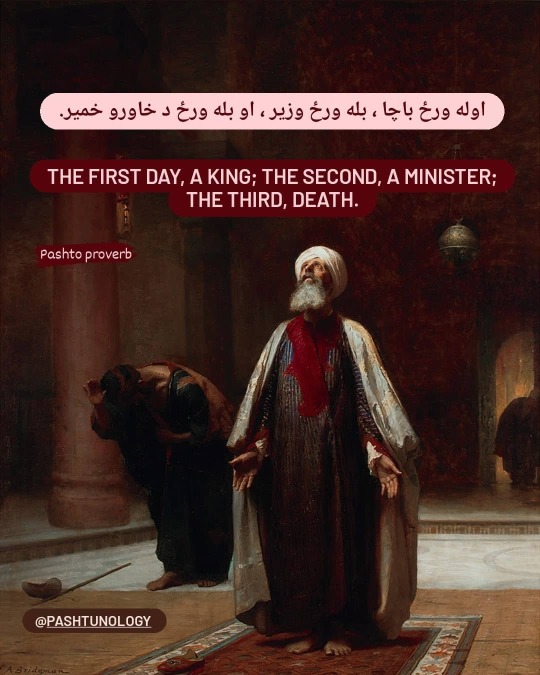
Transliteration:
"Awala wraz baachaa, bala wraz wazir, aw bala wraz da khawro khamir"
The cycle of life is joy, worry and death. A youth is considered free of worry and free to enjoy himself, such as a king should be. The mature man, like a Prime Minister, has the responsibilities and worries attendant upon administering a country.
Alternatively, it is about the untrustworthiness and changing scenarios of life.
The idiom used for death is literally "the yeast (leaven) of dirt" (khawro khamir). When Pashtuns make bread (nän), they leaven it by adding a little bit of yeast (khamir) kept back from the previous batch. In the picturesque language of this rhyming proverb, even the mighty king and wazir (minister) become khamir (yeast) that is added to the earth as part of the cycle of life.
This proverb reminds me of a couple of lines by Ghani Khan.
پرون تخم وم، نن ګل یم، سبا بیا به خاؤره کېږم
زه د باد یوه څپه یم، په صحـــــرا په باغ تېرېږم
"Yesterday a seed, today a flower, tomorrow I’ll turn to dust;
I am a gust of wind blowing over the desert garden"
#afghanistan#pashto#pashtun#afghan#art#literature#proverbs#idioms#pashto poetry#poetry#middle east#central asia#افغانستان#khyber pakhtunkhwa#kandahar#kabul#peshawar#pashtunology
32 notes
·
View notes
Photo
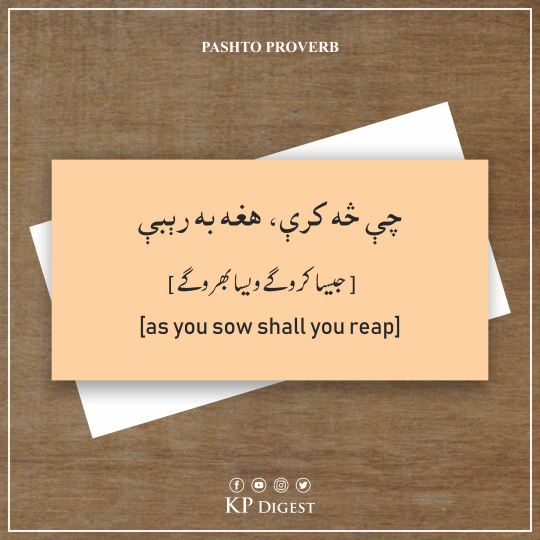
Pashto Proverb
"چې څه کرې هغه به رېبې"
[جیسا کرو گے ویسا بھروگے]
[as you sow shall you reap]
#kp digest#pashto proverb#learn pashto#pashto learning#Pashto Language#language#learning#lesson of the day#Word of the day
5 notes
·
View notes
Text
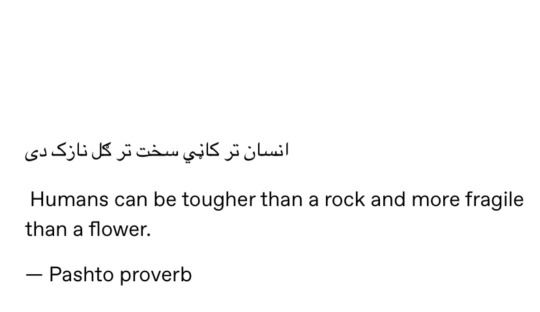
38 notes
·
View notes
Quote
If it rains on you,
the drops will fall on me.
1 note
·
View note
Quote
د غر په تېګه خږ شو، د کور مېچن ېۍ ماته کړه
Hurt by a rock on the mountain, he came home to break the grinding stone.
(Referring to domestic abuse)
Pashto Proverb
48 notes
·
View notes
Quote
ستاسو زړه د افغانستان په څیر دی، ډیری یې د فتح کولو هڅه کوي. هیڅوک بریالي نه شول
Your heart is like Afghanistan, many try to conquer. Not one has succeeded.
- PoeticallyPashtun
595 notes
·
View notes
Text
Humans can be tougher than a rock and more fragile than a flower.
- Pashto proverb

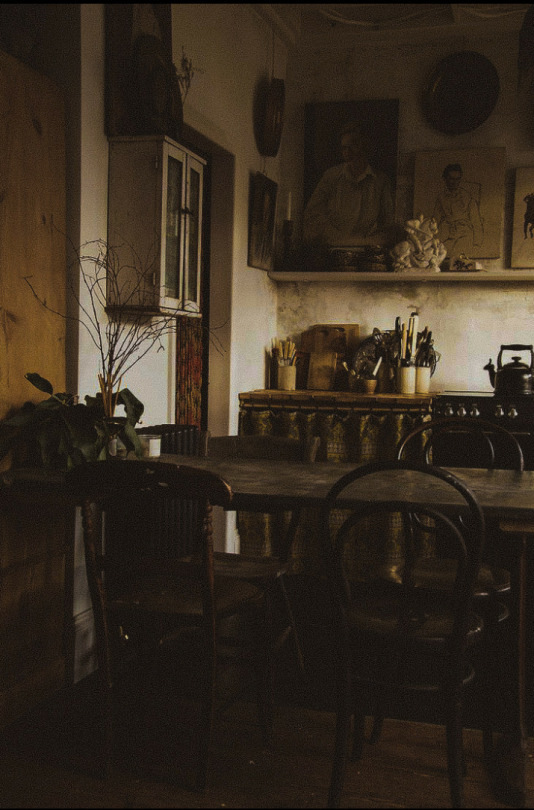
#pashtoproverb#poetry#quotes#writerscommunity#words#feelings#dark academia#spilled poetry#aesthetic#literature#vintage#prose#prosepoetry#tumblr#poetsontumblr#spilled#lightacademia
5 notes
·
View notes
Text
King of the Khyber Rifles (1916)
Who wants to hear about the absolutely unhinged WWI-era adventure novel I binge-read recently? Great! This bizarre and fantastic spy story reads either like an H. Rider Haggard novel or a sort of James Bond avant la lettre, depending on your point of view. I am perhaps its ideal audience. I say this because 1) I had my literary tastes shaped by reading a lot of Kipling, Conan Doyle, and even H. Rider Haggard in my adolescent years (honorable mention to Anthony Hope Hopkins and the Baroness d’Orczy) and 2) not entirely unrelatedly, I grew up, went to grad school, and did a lot of reading about power, gender, and race in the British Empire. This book is a penny dreadful adventure/romance that obviously needs to be adapted into a miniseries if and only if the production team has read Homi Bhabha on ambivalence and is ready to get subversive. That said... get ready for a tale of heroism! romance! and very large explosions!
Our eponymous hero is Captain Athelstan King, officer in the Khyber Rifles. Despite having the most English name possible, he has lived in India all his life, like generations of his forebears. And it is precisely because of this background, and this cultural fluency and sympathy, that he is picked for a Dangerous Top-Secret Mission. (India is described as having “pickled his heritage” by English officers who also think he is weird because he sits around reading books.) In response to the general giving him his orders:
King grunted with the lids half-lowered over full dark eyes. He did not look especially handsome in that attitude. Some men swear he looks like a Roman, and others liken him to a gargoyle, all of them choosing to ignore the smile that can transform his whole face instantly.
Gargoyle-hot! culturally-hybrid! This is the kind of hero I signed up for.
Since WWI is happening, Britain wants to guard the Northwestern Frontier; Punjabi troops are racing westward to France and there needs to be a Raj for them to come back to. Do I want to be on the production team for a miniseries that introduces the independence movement into all this? yes. King’s mission is to quell or prevent the rebellion and/or invasion that threatens from what is now Afghanistan. And to do this, he must work with Yasmini, the biracial widow of a rajah, now a dangerously knowledgeable, infamously capable spy. King is given her photograph:
King took the package and for a minute stared hard at the likeness of a woman whose fame has traveled up and down India, until her witchery has become a proverb. [...] The general watched his face with eyes that missed nothing.
“Remember--I said work with her!”
It was at this point that I texted my sister and said that I would riot if this did not lead to torrid romance. In beginning his mission, King proceeds to:
stuff his face with curry to avoid awkward questions (relatable)
be subtly insulting to English officers
use Hindi honorifics for local railway clerks
get an assassin arrested
avoid getting stabbed by a second assassin
keep Assassin #2′s knife, the handle of which is molded in the shape of Yasmini’s body
(yes really)
Having arrived in Delhi, he proceeds to form a very flirtatiously charged alliance with a young Rajput warrior, whose elegant wrists and figure are dwelt on at such length that I promptly concluded that either 1) this novel was, whether intentionally or not, much queerer than supposed or 2) the Rajput was Yasmini cross-dressing. The author is too coy to give us explicit textual confirmation of the latter. But the Rajput’s eyes are described as “hot pools of mystery,” a twin challenge to the seductive dancing girls with which “he” surrounds King. Ahem.
Our hero then forms a partnership with Ismail, the Afridi warrior who is assigned to him by Yasmini as a guide and guardian, and proceeds to break 30 tribesmen out of a British prison, which he can do because 1) Yasmini (still cross-dressing) has given him a talisman 2) he speaks Pashto and Hindi, and the jailer doesn’t.
Accompanied by his lively and now at least conditionally devoted retinue, King ascends into the Hindu Kush, but not before contemplating it in “wan, weird moonlight.” He arranges a meeting with his younger brother, which gives rise to the following delightful dialogue:
“Glad to see you, old man,” said Athelstan.
“Sure, old chap!” said Charles; and they shook hands.
“What's the desperate proposal?” asked the younger.
“I'll tell you when we are alone.”
He then disguises himself as a Rajasthani doctor, discovers a secret passage, and proceeds to penetrate the stronghold of Yasmini, which is a cave (subtle.) He still wears the knife next to his skin. But he is playing a dangerous game between the faction of those who openly hate him, and that of her men, and which way she will throw herself in the political balance is uncertain. He narrowly escapes death at the hands of angry warriors by displaying his brother’s severed head to them, and then narrowly escapes death crawling over a mountainside in the dark. He is told that unless he flees for his life, he will cease to be himself. He then meets Yasmini in her own person (“Touch and scent and confidence, all three were bewitching; all three were calculated, too.”) The romance, it is TORRID. And it takes less than half a page to get from “the delirium of human passion loosed and given” (HELLO) to “You think because I love you, you can feed my love on a plate to the Indian government?” I enjoy adventure novels precisely for this reason.
Yasmini writes a letter to King’s superior officers informing them that he is a traitor (obviously wrong, also bad.) King is then captured by the large, brutal, and cynical warlord who is leading a campaign down into India (arguably worse.) He is still successfully passing himself off as a doctor (having done all that reading-up on medicine and surgery in the early chapters. Love a bit of narrative payoff.) At the warlord’s direction, he writes a letter to Yasmini... but he writes in Urdu, a language the other man does not read; he praises her beauty and her wisdom, begs for her loyalty, and pledges her his devotion (swoon.)
Then Yasmini -- still dressed as the Rajput warrior -- shows up and tries to kill him. They proceed to have a very sexually-charged fight, after which King gloomily concludes that Yasmini must be this “other man’s” lover. (Is our hero really that oblivious at this point? Apparently!) Fortunately, Ismail shows up helps set in motion King’s Cunning Plan™ of winning over the hostile army by which he is surrounded. It helps that he’s been tending their wounds and curing their ailments for the past few days. With this secret secondary mission, he marches back to the mountain stronghold in the power of the enemy warlord. Said warlord proceeds to march into the stronghold... and Yasmini blows the whole thing up using her stockpiled dynamite. It is at this point that King figures out who the slender warrior who tried to kill him is.
Reeling with exhaustion and a sense of anti-climax, King and the disguised Yasmini and a miniature army of men with their households behind them tramp down from the hills. King’s friend Courtenay, at his request, allows him to take a bath, but is so stand-offish in his manner that King asks why, only to be informed that he’s been put under arrest for treason. This is only resolved after the following astonishing sequence:
And then the general came and did not wait for King to get dressed but burst into the bathroom and shook hands with him while he was still naked and asked ten questions (like a gatling gun) while King was getting on his trousers, divining each answer after the third word and waving the rest aside.
I just... I just like this weird book. King tells his tale to the general, breaks the cross-dressing woman who loves him out of jail, and eats bread and cocoa while debriefing. And that’s the end! except that the readers who have hung on through all of this are promised that “the chances for intrigue are almost infinite, given such combination as King and Yasmini and a love affair.”
--The End--
#this has been weird recaps of weird novels#king of the khyber rifles#talbot mundy#pulp fiction#adventure novels#i wallow in feelings about wwi: an infinite series#wwi
23 notes
·
View notes
Quote
Dear grandfather,
your features are falling
on our faces like velvet
curtains; elegant eyes of an Afghan
representing a
tribe of a proud nation.
We inherited that.
And in my dreams
you know me better than anyone.
You call on me in Pashto,
or maybe Dari,
or even Farsi,
you could speak all of the languages.
There was so little of you
but so much of you in us.
Some tragedies leave
so much love behind,
and
I know
my father loves you more
than
you could imagine.
And he made
all of his success with
the lessons you left behind.
Grandfather,
your family calls me ‘jan'
and it is bittersweet,
like the seeds of a pomegranate,
cause I wish I had all of my uncles
and aunts,
and all of their children here with us.
You taught my father
how to migrate,
how to build a home in a country
where
it wants to send you back where
you came from.
But you were a cartographer,
you knew that borders
are just drawing lines,
it means nothing if you have the
charm of an immigrant.
My grandfather,
we are educated,
with bachelor degrees,
masters even,
talents and passion.
Like you.
We never learnt our
father’s language,
but lately,
your language is yearning
to be pronounced.
Every word is a poem.
Every sentence is a proverb.
And all the lyrical
letters are crying in silence.
You would still be proud,
your son re-learn it all
like an old childhood song.
We still call Afghanistan
on the phone,
we still send photographs,
and my father’s old siblings
are scolding him that he should be
speaking Persian better.
After all, he is not a European.
Dear grandfather,
would you read my poetry when
I meet you in heaven?
Would you pronounce my
name the right way?
Would you know I have searched
for you?
Would you know my father never stopped
mentioning you?
Would you know we never forgot you?
Generations later,
we were still lion kings.
The Lion King from The Immigration Series by Royla Asghar
#immigration#series#lion king#father#grandfather#family#love#poetry#afghan#afghanistan#haiku#prose#beautifu#spoken word#spilled ink#thoughts#poet#poem#love poem#royla asghar#poems of madness#words#writer#writing#creative writing
460 notes
·
View notes
Text
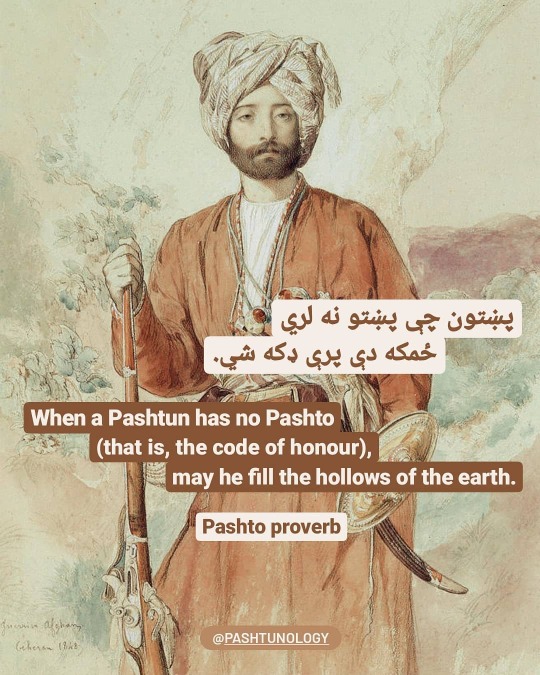
The Pashtun must follow a strong code of honor, that is, family and traditions. [Pashto or Pakhto (the same word as the language), also known as Pashtunwali, is a traditional code embodying Pashtun understandings of "honour", and covers every aspect of personal, family and tribal life. To keep the code is called "doing Pashto". Pashtunwali/Pashto may best be viewed as a composite notion that embraces the customs and behaviour, morality, ethos, and notion of ancestral heritage associated with "being Pashtun".
This proverb asserts that honour and Pashtunwali are bound up with the very essence of "Pashtunness" and Pashtun identity, without the spirit of Pashto, one might as well be "swallowed up by the earth", i.e. dead.
#pashtunology#afghanistan#pashto#pashtun#afghan#art#khyber pakhtunkhwa#proverbs#idioms#culture#literature#پښتو#pakhtun#iran#india#pakistan#muslim#warrior#pashtun history#history
21 notes
·
View notes
Photo
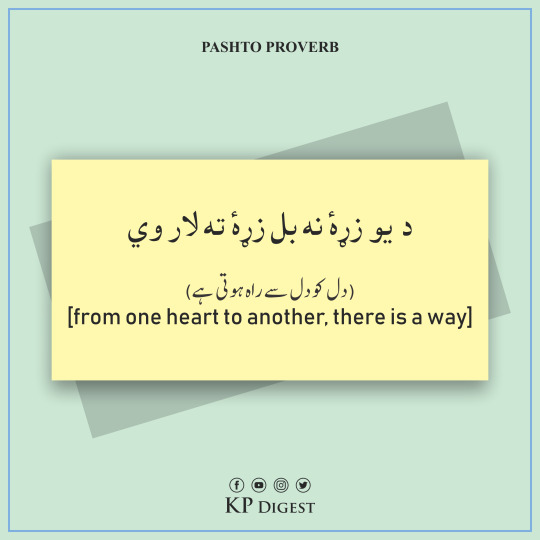
Pashto Proverb
د يو زړۀ نه بل زړۀ ته لار وي
(دل کو دل سے راہ ہوتی ہے)
[from one heart to another, there is a way]
#KPDigest
2 notes
·
View notes
Text
Spee ghapizhi, caravan terizhi.
Dogs bark, but the caravan goes on.
—Pashto proverb
4 notes
·
View notes
Text
Har chata khpal watan kashmir de
“Everyone's own country is Kashmir to him” (Afghan Pashto proverb)
Meaning: In a persons eyes, there is no place in this world more beautiful than their homeland.
138 notes
·
View notes
Quote
وایي وخت هغه اور دی چی مونږ پکې سوزو
They say time is the fire in which we burn.
Pashto Proverb
676 notes
·
View notes
Quote
د يو سواره به څه دوړه وي؟
With one horseman, what dust cloud?
Meaning: One swallow makes not a spring, nor one woodcock a winter.
Pashto proverb
58 notes
·
View notes
Text
“After every darkness, there is light.”
An Afghan proverb (language is Pashto): بعد از هر تاریکی روشنایی است
(Ba’d az har tariki, roshanai ast)
and
“The seeker is the finder”
An Afghan proverb (language is Pashto): جوینده یابنده است
(Joyenda yabenda st)
#afghanistan#everycountry#travel#traveler#studyblr#studying#quotes#motivation#motivational#quote#dark#darkness#afghan#middle east#proverbs#sayings#hope#love#light#inspire#inspiration#Handwriting#language#linguist
12 notes
·
View notes